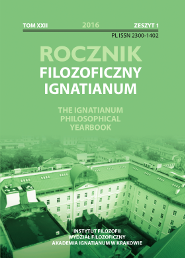Subjective and situational conditions affecting personality development
Abstract
Personality development takes place through mutual interactions involving the person and their environment. It can be analyzed and described on three levels: basic dispositions (traits), characteristic adaptations (e.g. basic beliefs, desires or goals), and personal meanings (narrative identity). The phenomena and processes involved are different on each level. Analyses of this are concerned with what promotes and/or inhibits developmental changes of personality. This article introduces the notion of reasons for great life changes, as well as Zenomena Płużek’s conception of personality development.References
Bandura A (2006), "Toward a Psychology of Human Agency" (1(2)), pp. 164-180.
Bandura A (2001), "Social Cognitive Theory: An Agentic Perspective" (52(1)), pp. 1-26.
Funder DC (2008), "Persons, Situations and Person-Situation Interactions", In Handbook of Personality. , pp. 568-580. Guilford.
Hermans HJM and Hermans-Jansen E (2000), "Autonarracje: Tworzenie znaczeń w psychoterapii" Pracownia Testów Psychologicznych Polskiego Towarzystwa Psychologicznego.
Jacyniak A and Płużek Z (1996), "Świat ludzkich kryzysów" Wydawnictwo WAM.
Kelly GA (1955), "The Psychology of Personal Constructs" Norton.
Kluckhohn C and Murray HA (1953), "Personality Formation: The Determinants", In Personality in Nature, Society, and Culture. , pp. 53-67. Alfred A. Knopf.
Larsen RJ and Buss DM (2005), "Personality Psychology: Domains of Knowledge about Human Nature" McGraw-Hill.
McAdams DP (1993), "The Stories We Live By: Personal Myths and the Making of the Self" William Morrow.
McAdams DP and Pals JA (2006), "A New Big Five. Fundamental Principles for an Integrative Science of Personality" (61(3)), pp. 204-217.
McCrae RR and Costa PT (2005), "Osobowość dorosłego człowieka: Perspektywa teorii pięcioczynnikowej" Wydawnictwo WAM.
Oleś PK (2013), "Psychologia przełomu połowy życia" Towarzystwo Naukowe KUL.
Oleś PK (2011), "Psychologia człowieka dorosłego: Ciągłość - zmiana - integracja" Wydawnictwo Naukowe PWN.
Oleś PK and Sobol-Kwapińska M (2013), "Towards a Dynamic Approach to the Individual Differences - “Though This Be Madness, Yet There Is Method in It”" (2013), pp. 365-369.
Płużek Z (1974), "Człowiek w poszukiwaniu samego siebie", In Człowiek, istnienie i działanie. , pp. 9-26. Wydawnictwo WAM.
Płużek Z (1994), "Rozwój jest procesem stawania się: Wprowadzenie do problematyki rozwoju osobowości", In Jak sobie z tym poradzić: Dla rodziców, nauczycieli, katechetów, wychowawców. , pp. 13-26. BIBLOS.
Płużek Z (2001), "Proces twórczego kształtowania osobowości w świetle teorii C.G. Junga" Towarzystwo Naukowe KUL.
Płużek Z (1991), "Psychologia pastoralna" Instytut Teologiczny Księży Misjonarzy.
The Yearbook only accepts materials for publication that are free of all conflicts of interest, and that in no way involve conflicts over authorship, copyright, etc. The Editors will take action against any cases of plagiarizing, ghostwriting1, guest/honorary authorship2, etc. Where co-authored work is concerned, the Author listed first is expected to take responsibility for the submission, and is required to make clear the contributions of all of the Co-Authors involved. In the event of the publication owing its existence to funding dedicated to this purpose, this fact should be made clear: e.g. in any note of thanks/acknowledgement, or in a footnote, etc. Explicit notification should be given of any form of reprinting, with the appropriate evidence of permission to publish being furnished as required. Any impropriety on the part of Authors/Reviewers risks exposing them to appropriate responses from the relevant institutions.
______
1 This term refers to instances of a person who has made an essential contribution being omitted from the list of authors, or from notes conveying gratitude and/or acknowledgement.
2 This occurs when a person who has made either an insignificant contribution or no contribution at all nevertheless appears on the list of authors.





